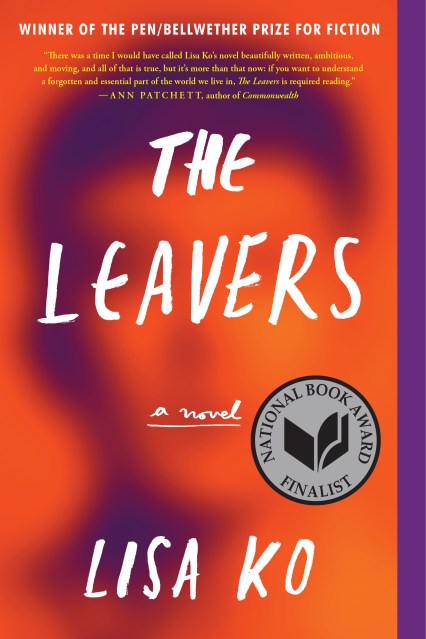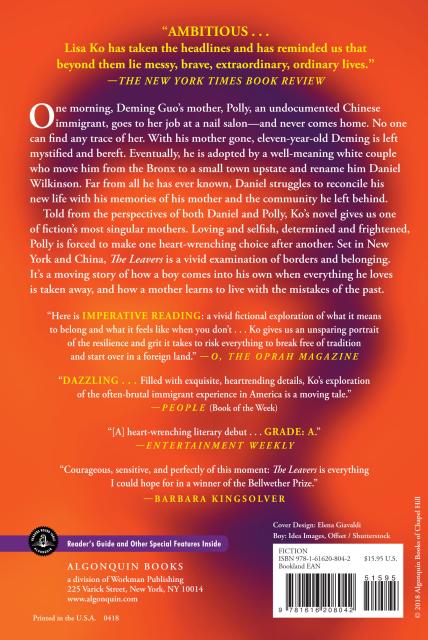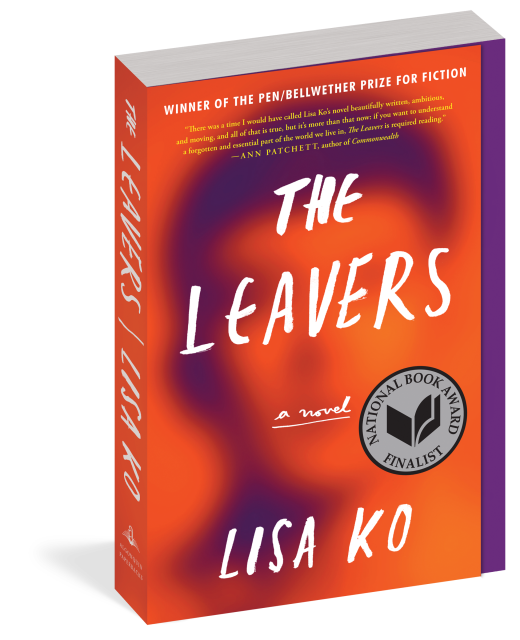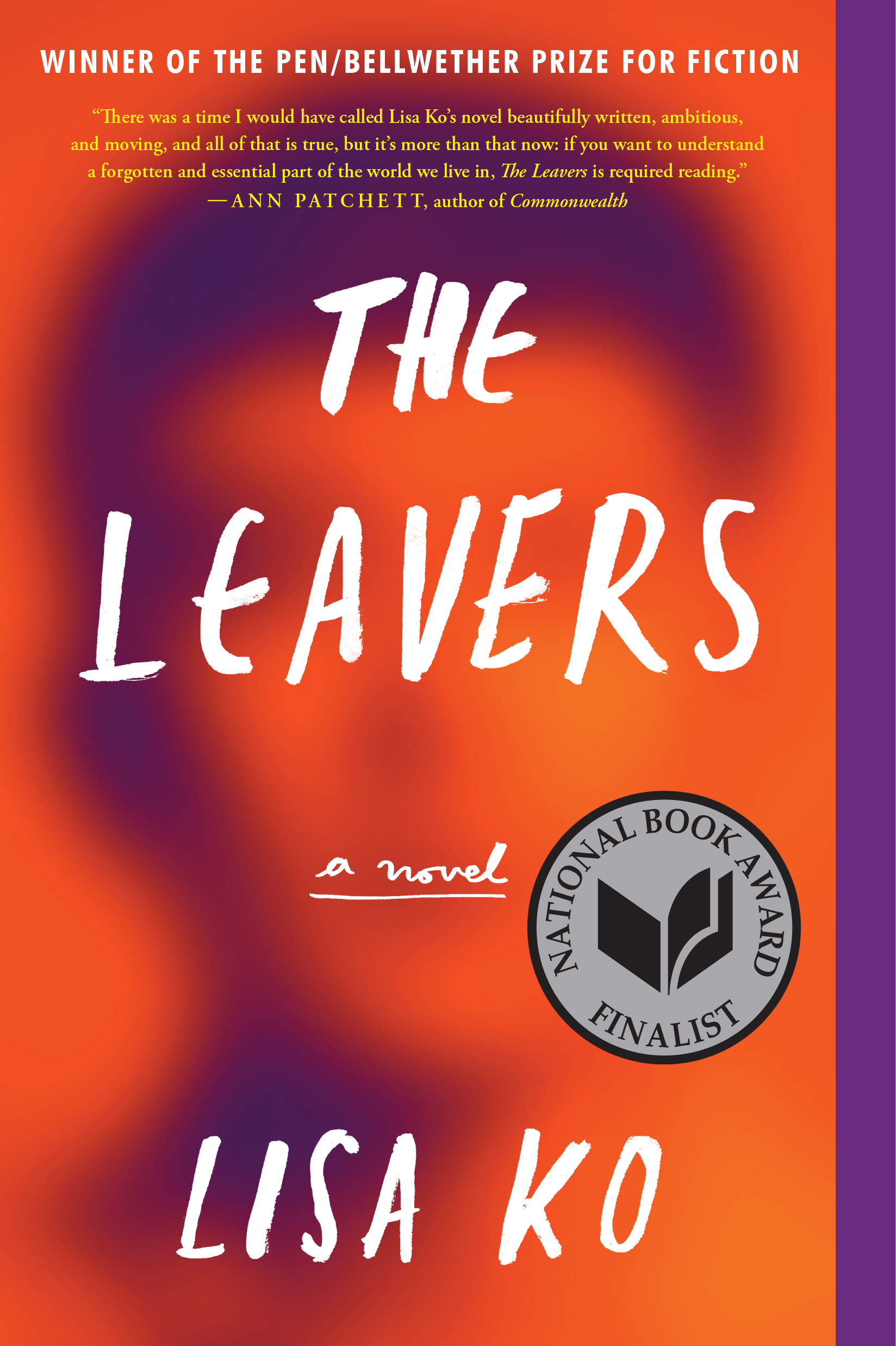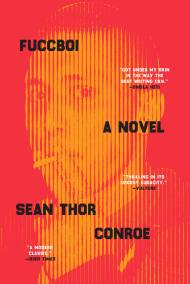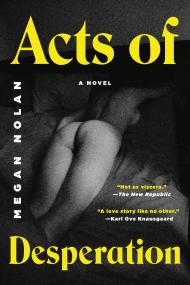Promotion
Use code MOM24 for 20% off site wide + free shipping over $45
The Leavers (National Book Award Finalist)
A Novel
Contributors
By Lisa Ko
Formats and Prices
Price
$18.99Price
$24.99 CADFormat
Format:
- Trade Paperback $18.99 $24.99 CAD
- ebook $11.99 $15.99 CAD
This item is a preorder. Your payment method will be charged immediately, and the product is expected to ship on or around April 24, 2018. This date is subject to change due to shipping delays beyond our control.
Also available from:
This award-winning novel from the author of Memory Piece is a moving story of how a boy comes into his own when everything he loves is taken away, and how a mother learns to live with the mistakes of the past.
One morning, Deming Guo’s mother, Polly, an undocumented Chinese immigrant, goes to her job at a nail salon—and never comes home. No one can find any trace of her.
With his mother gone, eleven-year-old Deming is left mystified and bereft. Eventually adopted by a pair of well-meaning white professors, Deming is moved from the Bronx to a small town upstate and renamed Daniel Wilkinson. But far from all he’s ever known, Daniel struggles to reconcile his adoptive parents’ desire that he assimilate with his memories of his mother and the community he left behind.
Told from the perspective of both Daniel—as he grows into a directionless young man—and Polly, Ko’s novel gives us one of fiction’s most singular mothers. Loving and selfish, determined and frightened, Polly is forced to make one heartwrenching choice after another.
Set in New York and China, Lisa Ko’s The Leavers shares a vivid examination of borders and belonging, which earned it the 2016 PEN/Bellwether Prize for Fiction, awarded by Barbara Kingsolver for a novel that addresses issues of social justice.
"Required reading.” —Ann Patchett
National Book Award finalist
Named a Best Book of 2017 by NPR, Entertainment Weekly, the Los Angeles Times, BuzzFeed, Bustle, and Electric Literature
One morning, Deming Guo’s mother, Polly, an undocumented Chinese immigrant, goes to her job at a nail salon—and never comes home. No one can find any trace of her.
With his mother gone, eleven-year-old Deming is left mystified and bereft. Eventually adopted by a pair of well-meaning white professors, Deming is moved from the Bronx to a small town upstate and renamed Daniel Wilkinson. But far from all he’s ever known, Daniel struggles to reconcile his adoptive parents’ desire that he assimilate with his memories of his mother and the community he left behind.
Told from the perspective of both Daniel—as he grows into a directionless young man—and Polly, Ko’s novel gives us one of fiction’s most singular mothers. Loving and selfish, determined and frightened, Polly is forced to make one heartwrenching choice after another.
Set in New York and China, Lisa Ko’s The Leavers shares a vivid examination of borders and belonging, which earned it the 2016 PEN/Bellwether Prize for Fiction, awarded by Barbara Kingsolver for a novel that addresses issues of social justice.
"Required reading.” —Ann Patchett
National Book Award finalist
Named a Best Book of 2017 by NPR, Entertainment Weekly, the Los Angeles Times, BuzzFeed, Bustle, and Electric Literature
Genre:
-
“Here is imperative reading: a vivid fictional exploration of what it means to belong and what it feels like when you don't . . . Ko gives us an unsparing portrait of the resilience and grit it takes to risk everything to break free of tradition and start over in a foreign land.”
—O, The Oprah Magazine (Favorite Books of 2017)
"[A] dazzling debut . . . Filled with exquisite, heartrending details, Ko’s exploration of the often-brutal immigrant experience in America is a moving tale of family and belonging.”
—People (Book of the Week)
“When Deming Guo was 11, his Chinese immigrant mother, Polly, left for work at a nail salon and never returned. In alternating perspectives, this heart-wrenching literary debut tells both of their stories. Grade: A.”
—Entertainment Weekly
“Ambitious . . . Lisa Ko has taken the headlines and has reminded us that beyond them lie messy, brave, extraordinary, ordinary lives.”
—The New York Times Book Review
“This wrenching and all-too-topical debut novel picks up the life of an 11-year-old American-born boy on the day his mother, an undocumented Chinese immigrant, disappears . . . Ko uses the voices of both the boy and his birth mother to tell a story that unfolds in graceful, realistic fashion and defies expectations.”
—Janet Maslin, The New York Times
“Lisa Ko’s The Leavers is the year’s powerful debut you won’t want to miss. The Leavers expertly weaves a tale of the conflicts between love and loyalty, personal identity and familial obligation, and the growing divide between freedom and social justice. An affecting novel that details the the gut-wrenching realities facing illegal immigrants and their families in modern America, Lisa Ko’s debut is the 2017 fiction release you can’t afford to miss.”
—Bustle.com
“An exceptionally well written, fully realized work of art portraying the circumstances and inner worlds — the motives and emotional weather — of its two central characters. Ko is so psychologically penetrating, so acute in her passing observations and deft in the quick views she affords of her characters’ inner lives and surroundings, that her skill and empathy give real joy.”
—Barnes Noble Review
“The Leavers describes the devastation caused by forced, abrupt and secret detentions that occur daily under our current Immigration Act. The novel weaves from past to present, from immediate abandonment to chronic loss, showing how the unfathomable disappearance of a mother eats into her son's effort to "move forward.” . . . The story soars when Ko writes of immigration detention— a civil detention for violation of a civil law that is as callous and brutal as the worst sort of criminal incarceration . . . [The Leavers] lets us feel the knife twist of sweeping government authority wielded without conscience or control. [Ko’s] work gives poignant voice to the fact the U.S. can, and must, write a better immigration system.”
—Ms. Magazine
“Consider this book a must-read: They may be fictional, but these characters have a lot to teach us about the difficulties of belonging and the plight of illegal immigrants.”
—Marie Claire
“Poignant and timely, this novel is ripe for discussion.”
—Real Simple
“One of 2017's most anticipated fiction debuts… The winner of last year's PEN/Bellwether Prize, which recognizes fiction that explores issues of social justice, The Leavers feels as relevant as ever as the future of immigrants in America hangs in the balance.”
—Time.com
“Ko’s debut is a sweeping examination of family through the eyes of a single mother, a Chinese immigrant, and her U.S.-born son, whose separation haunts and defines their lives. Ko’s stunning tale of love and loyalty – to family, to country—is a fresh and moving look at the immigrant experience in America, and is as timely as ever.”
—Publishers Weekly, starred review
“Touching upon themes such as identity, determination, addiction, and loyalty, the author clearly shows readers that she is an emerging writer to watch. Ko’s writing is strong, and her characters, whether major or minor, are skillfully developed. Readers who enjoy thoughtfully told relationship tales by authors such as Lisa See, Jamie Ford, and Nadia Hashimi will appreciate.”
—Library Journal, starred review
“Vividly written and moving, The Leavers is an engrossing story of one young boy struggling to adjust to his new life without his mother and community.”
—Buzzfeed
“A timely touching story . . . excellent: compelling, well-realized, gritty and complicated.”
—Kansas City Star
“The Leavers is a masterful debut novel that examines borders and belonging, and the universal desire for love.”
—Redbook.com
“This excellent book has already won the PEN/Bellwether Award for Socially Engaged Fiction (selected by Barbara Kingsolver). One morning, eleven-year-old Deming Guo’s mother is unexpectedly deported to China. Deming is then adopted by a white family and renamed Daniel Wilkinson. But as he grows up, he struggles to reconcile his new life with his former one.”
—Bustle.com
“Ko’s debut novel has already won the 2016 Pen/Bellwether Award for Socially Engaged Fiction, a prize created and selected by Barbara Kingsolver. The contest awards a novel that 'addresses issues of social justice and the impact of culture and politics on human relationships,’ and Ko’s book certainly fits that laudable description.”
—TheMillions.com
“An inspiring debut, which focuses on issues of assimilation and the true meaning of home. Ko’s unforgettable narrative voice is a credit to the moving stories of immigration, loss, recovery, and acceptance that feel particularly suited to our times.”
—Nylon Magazine
“Lisa Ko’s The Leavers, which won the PEN/Bellwether Prize, may be a work of fiction, but the plot twists mirror America’s own urgent and timely political landscape.”
—W Magazine
“Gorgeously redemptive . . . Lisa Ko’s debut novel is an achingly beautiful read about immigration, adoption, and the drive to belong. Beyond the desensitizing media coverage, Ko gives faces, (multiple) names, and details to create a riveting story of a remarkable family coming, going, leaving . . . all in hopes of someday returning to one another.”
—Christian Science Monitor
“If you come away from reading The Leavers with a sense of disconnect, that’s no surprise—disconnectedness is its central theme, its structural and stylistic touchpoint, and the emotional engine driving its main characters . . . The Leavers stands firmly as Lisa Ko’s act of arrival.”
—The Rumpus
“A searing novel about a mother and son who are separated by forces beyond their control in New York, a book that promises to challenge our perceptions of immigration, adoption, family and American values.”
—Kveller.com
“This timely novel depicts the heart- and spirit-breaking difficulties faced by illegal immigrants with meticulous specificity.”
—Kirkus Reviews
“Skillfully written . . . those who are interested in closely observed, character-driven fiction will want to leave room for The Leavers on their shelves.”
—Booklist
“What Ko seeks to do with The Leavers is illuminate the consequence of [deportation] facilities, and of the deportation machine as a whole, on individual lives. Ko’s book arrives at a time when it is most needed; its success will be measured in its ability to move its readership along the continuum between complacency and advocacy.”
—Los Angeles Review of Books
“The Leavers . . . using effective literary techniques and beautiful language—powerfully illustrates the impact that social policies and injustice have on the lives of individuals and families.”
—Bookreporter.com
An “assured debut novel…a timely story of immigrant families in America…a thoughtful work about undocumented immigrants and the threats they endure.”
—BookPage
"There was a time I would have called Lisa Ko’s novel beautifully written, ambitious and moving, and all of that is true, but it’s more than that now: if you want to understand a forgotten and essential part of the world we live in, The Leavers is required reading.”
—Ann Patchett
"Courageous, sensitive, and perfectly of this moment: The Leavers is everything I could hope for in a winner of the Bellwether Prize."
—Barbara Kingsolver
“In The Leavers, Lisa Ko has created one of the most courageous mother character's in recent memory. Polly is brash, brave and heartbreaking and her ferocity is marvelous to behold. The Leavers is about the bonds between parents and children and the many pulls of home. It was a book I did not want to end.”
—Kaitlyn Greenidge, author of We Love You, Charlie Freeman
"A rich and sensitive portrait of lives lived across borders, cultures, and languages. . . one of the most engaging, deeply probing, and beautiful books I have read this year."
—Laila Lalami, author of The Moor’s Account
"A moving mother/son story and welcome contribution to immigrant literature. In writing about Polly and her son Deming, Ko captures one family's unique experience of becoming American while also exposing the loss of status, economic desperation, physical endangerment, and psychological grit of the undocumented worker as well as the alienation, double consciousness, mobility, and comparative access of the first generation."
—Emily Raboteau, author of Searching for Zion
“The story’s most heartbreaking disclosures are powerful in their indictment of the unrealistic expectations placed upon struggling families.”
—Foreword Reviews
- On Sale
- Apr 24, 2018
- Page Count
- 368 pages
- Publisher
- Algonquin Books
- ISBN-13
- 9781616208042
Newsletter Signup
By clicking ‘Sign Up,’ I acknowledge that I have read and agree to Hachette Book Group’s Privacy Policy and Terms of Use
